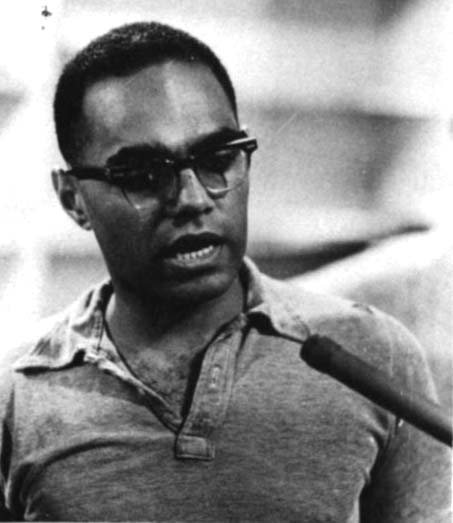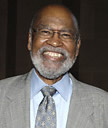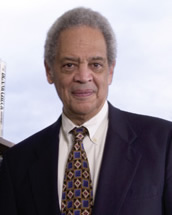Conversations on Principled Lawyering in Times of Political Crisis
(September 21, 2007)
SPEAKER BIOGRAPHIES
 John Doar
John Doar
One of the legal giants of our time, John Doar was born in Minneapolis in 1921 and graduated from Princeton University and Boalt Hall School of Law. He joined the Civil Rights Division of the Department of Justice in 1960 and served as Assistant Attorney General for Civil Rights during the height of the Civil Rights Movement. It was during this time that Doar became a mentor to the young Thelton Henderson as they sought to personify justice in the deep South.
In September 1962 Doar stood beside James Meredith as the Governor of Mississippi attempted to prevent Meredith from registering as the first black student at the University of Mississippi. In the following year he placed his body between a phalanx of heavily armed local police and a large group of Committee of the U.S. House of Representatives as it investigated the Watergate scandal and voted Articles of Impeachment against President Nixon. Doar is now Senior Counsel at Doar Rieck Kaley & Mack in New York City specializing in complex litigation.
Judge Thelton E. Henderson
From his earliest years growing up in Watts, Thelton Henderson’s mother convinced him that he was going to be somebody in the world. Henderson went to UC Berkeley on a football scholarship, but a knee injury ended his football career and focused his energies on academics. One of only two African-American students in the Boalt Hall class of 1962, Thelton started his legal career as the first black attorney at the Civil Rights Division of the US Department of Justice. He went South to investigate voting rights abuses and soon confronted the challenge of being a black man in authority within the largely white world of the American legal system. He became a bridge between the Kennedy Justice Department and the leaders of the civil rights movement whom he came to know when they were all forced to lodge in the same segregated hotels throughout the South. As a young lawyer and a representative of the federal government, Henderson grappled with many tough choices, including the decision to loan his car to Dr. Martin Luther King, Jr. one fateful night, a crucial act which ultimately cost him his job.
Returning to California, Henderson became the first legal aid attorney in East Palo Alto once again forging a new path. Distressed to learn that neighboring Stanford Law School had only graduated its first black attorney in 1968, Thelton became its Assistant Dean in charge of recruiting students of color. When he left Stanford in 1976 to practice law, twenty percent of the entering class were students of color and Henderson’s program became a nationwide model. While Henderson was in private practice with partners Sandy Rosen and Joe Remcho and teaching at Golden Gate Law School, he was nominated to the federal bench. Selected by President Jimmy Carter in 1980 to sit in the Northern District of California, Thelton Henderson became the only African-American judge on that court for ten years. He was selected as its first black Chief Judge in 1990 and served in that post until 1997.
Throughout his distinguished career on the federal bench, Judge Henderson has ruled upon many of the most critical and difficult issues of our time. From halting the slaughter of dolphins by the tuna fishing industry, to striking down California’s controversial affirmative action initiative, to his recent decision placing the California prison health care system under federal receivorship, Thelton Henderson has demonstrated his conviction that the U.S. Constitution belongs to everyone.
 Robert Moses
Robert Moses
Robert Moses was born in Harlem, New York in 1935. A brilliant student, he studied philosophy at Harvard University and then taught mathematics at the Horace Mann School in New York. Moses left teaching to work full-time in the civil rights movement. He was field secretary for the Student Nonviolent Coordinating Committee (SNCC) and was director of SNCC’s Mississippi Project.
In 1961 Moses became a member of the Freedom Riders. After training in non-violent techniques, black and white volunteers sat next to each other as they traveled through the Deep South. Local police were unwilling to protect these passengers and in several places they were beaten up by white mobs and Moses endured numerous beatings and was often arrested. Moses emerged as one of the leading figures in SNCC and in 1964 was the main organizer of the Freedom Summer project. Its main objective was to try to end the political disenfranchisement of African Americans in the Deep South. He also organized the Mississippi Freedom Democratic Party, which challenged the Mississippi regulars at the 1964 Democratic Party Convention in Atlantic City.
After Stokely Carmichael was elected chairman of the SNCC in 1966, the organization became a supporter of black power. Disillusioned by this change, Moses left to become a teacher for the Ministry of Education in Tanzania. In 1976 Moses returned to Harvard to complete his doctorate in philosophy.
In 1982 Moses was awarded a MacArthur Fellowship and over the next five years he developed the Algebra Project, a national mathematics literacy effort aimed at helping low income students and students of color – particularly African American and Latino students – successfully achieve mathematical skills that are a prerequisite for a college preparatory mathematics sequence in high school. The Algebra Project has developed curricular materials, trained teachers & trainers of teachers, provided ongoing professional development support, and community involvement activities to schools seeking to achieve a systemic change in mathematics education.
Robert Moses has received several college and university honorary degrees and honors, including the Heinz Award for the Human Condition (2000), the Nation/Puffin Prize for Creative Citizenship (2001), the Mary Chase Smith Award for American Democracy (2002) and the James Conant Bryant Award from the Education Commission of the States (2002).
Brian Landsberg
Born in 1937, Brian Landsberg graduated form the University of California at Berkeley in 1959 and received his J.D. from Boalt Hall in 1962. He was a Trial Attorney in the Civil Rights Division of the U.S. Justice Department from 1964 to 1969 and went on to head its Education Section from 1969 to 1974 and its Appellate Section from 1974-1986. He returned to the Civil Rights Division from 1993 to 1994 as a Scholar-in-Residence and Acting Deputy Assistant Attorney General.
Landsberg has been a Professor of Law at University of the Pacific McGeorge School of Law since 1986 where he teaches Anti-Discrimination Legislation, Appellate Advocacy, Constitutional Law, Federal Courts, and Race and the Law. He served as Associate Dean from 2001-2002.
Landsberg has written several books including Enforcing Civil Rights: Race Discrimination and the Justice Department and Free At last To Vote: The Alabama Origins of the 1965 Voting Rights Act. He has served on the Board of Trustees of the Lawyers Committee for Civil Rights Under Law since 1996.
Roger Wilkins
Born in Kansas City, Missouri, Roger Wilkins received his B.A. in 1953 and his law degree in 1956 from the University of Michigan, where he interned with the NAACP. He worked as a welfare lawyer in Ohio before becoming an Assistant Attorney General in President Lyndon B. Johnson’s administration at the age of thirty-three.
Leaving government at the end of the Johnson administration, he worked briefly for the Ford Foundation before joining the editorial staff of The Washington Post. At the Post he earned a Pulitzer Prize in 1972 for exposing the Watergate scandal that eventually forced President Richard Nixon’s resignation from office. He left the Post in 1974 to work for The New York Times and in 1980 he became a radio news commentator for National Public Radio (NPR).
Wilkins is the Clarence J. Robinson Professor of History and American Culture at George Mason University in Fairfax, Virginia. His highly acclaimed autobiography, A Man’s Life (1982), was reprinted in 1991, and he was co-editor with Fred Harris of Quiet Riots in 1988. He has served on the Board of the NAACP Legal Defense Fund and is publisher of NAACP’s journal Crisis. His book Jefferson’s Pillow; The Founding Fathers and the Dilemma of Black Patriotism was published in 2001 and won the 2002 NAIBA Book Award for Adult Non-Fiction.
Jerome Waldie
Born in Antioch, California, on February 15, 1925, Jerome Waldie attended public schools in Antioch and served in the United States Army during World War II. He graduated from the University of California, Berkeley in 1950, and earned a law degree from Boalt Hall School of Law in 1953. After graduation from law school he practiced law in Antioch at a salary of two hundred and fifty dollars per month.
Waldie served as a Democratic member of the California State Assembly from 1959 to 1966 and was Majority Leader from 1961 to 1966. He was then elected to the Eighty-Ninth Congress, by special election, to fill the vacancy caused by the death of United States Representative John F. Baldwin. He was reelected to each of the four succeeding Congresses, serving from 1966 to 1975.
As a member of the House Judiciary Committee, Waldie was one of the first Congressman to announce that he would support the impeachment of President Nixon in the wake of the President’s firing of the Watergate Special Prosecutor and the resignations of the Attorney General and the Deputy Attorney General. He was an active member of the Committee and voted to impeach the President.
In 1974 Waldie ran for Governor of California but was defeated by Jerry Brown in the Democratic primary. He then served in the Carter Administration as Chairman of the Federal Mine Safety and Health Review Commission from 1978 to 1979 and Executive Director of the White House Conference on Aging in 1980. When President Reagan was elected in 1980, Waldie returned to California and was appointed a member of the California Agricultural Relations Board by Governor Brown from 1981 to 1985. He then became Chairman of the National Senior Citizens Legal Services Corporation. He is now retired and lives in Placerville, California.


